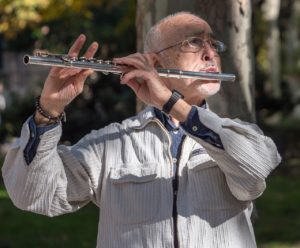
New study shows the elderly have better cognitive function in certain areas than their younger counterparts.
Aging is the unavoidable boogeyman for many people, to the point where anti-aging has become a $58.5 billion dollar industry that’s only projected to grow in the next decade. But it’s becoming more and more evident that aging isn’t necessarily a steady downhill slide.
Aside from platitudes about wisdom and studies showing an increased general contentedness in life, there are certain cognitive skills that stay sharp into old age and even outpace the results of younger participants, a new study shows.
The joint study from the University of Lisbon in Portugal and Georgetown University, published on August 19 in Nature Human Behaviour, examined over 700 adults aged 58–98 to investigate whether certain cognitive skills get better with old age. In one part of the study, researchers measured the volunteers’ attention in three areas through computerized tests.
The first test focused on responding to incoming information (alerting), the second on focusing attention on a certain location (orienting), and the third measured the participant’s ability to ignore extraneous information and focus on the task at hand (executive control). The scientists examined the results across the age range and adjusted for factors such as sex, education and visual ability.
The three cognitive abilities are constantly working together, making them ideal parameters to examine as we age. Lead author Dr. Joao Verissmo of the University of Lisbon ties all three together through the act of driving a car.

Driving requires three important cognitive skills, some of which improve with age.
“Alerting is your increased preparedness when you approach an intersection. Orienting occurs when you shift your attention to an unexpected movement, such as a pedestrian. And executive function allows you to inhibit distractions such as birds or billboards so you can stay focused on driving,” he explained.
There were expected drops in the older participants’ performance in response to incoming information and alertness. However, older participants showed increased efficiency in orienting their attention toward different objects. They were also better at ignoring distractions than younger participants.
Researchers found these improvements in cognitive skills occurred at different stages of aging. Middle-aged to older adult volunteers had better results in the orienting portion of the tests while the ability to ignore distractions continued to improve into the mid-late 70s before declining.
These gains in cognitive function go against commonly held beliefs about older adults’ deteriorating mental faculties. The researchers hypothesize that the reason for this could be as simple as repetition.

Learning diverse new skills may help seniors keep their minds sharp.
Credit: newlifestyles.com
“The results from our large study indicate that critical elements of these abilities actually improve during aging, likely because we simply practice these skills throughout our life.” Dr. Michael Ullman, Director of Georgetown’s Brain and Language Lab, said.
“Because we ruled out numerous alternative explanations, the findings should be reliable and so may apply quite broadly,” Dr. Veríssimo said. “Because orienting and inhibitory skills underlie numerous behaviors, the results have wide-ranging implications,” he added.
Executive control and orienting underlie many daily actions, and Dr. Ullman and Dr. Verissmo believe further research could not only expand our understanding of the aging mind but also provide valuable insights toward developing clinical improvements for patients with cognitive disorders such as Alzheimer’s.
For those looking to get ahead of the curve and stay sharper for longer, maintaining mental faculties is a lifelong effort. Aside from a variety of genetic factors, improved diet, exercise and social relationships are all excellent ways to keep your brain active and healthy.

 Cognitive Skills May Improve as We Age, Study Shows
Cognitive Skills May Improve as We Age, Study Shows


 “As Tears Go By” by Marianne Faithfull
“As Tears Go By” by Marianne Faithfull

 Funeral Favors Offer Visitors a Tangible Memento
Funeral Favors Offer Visitors a Tangible Memento















